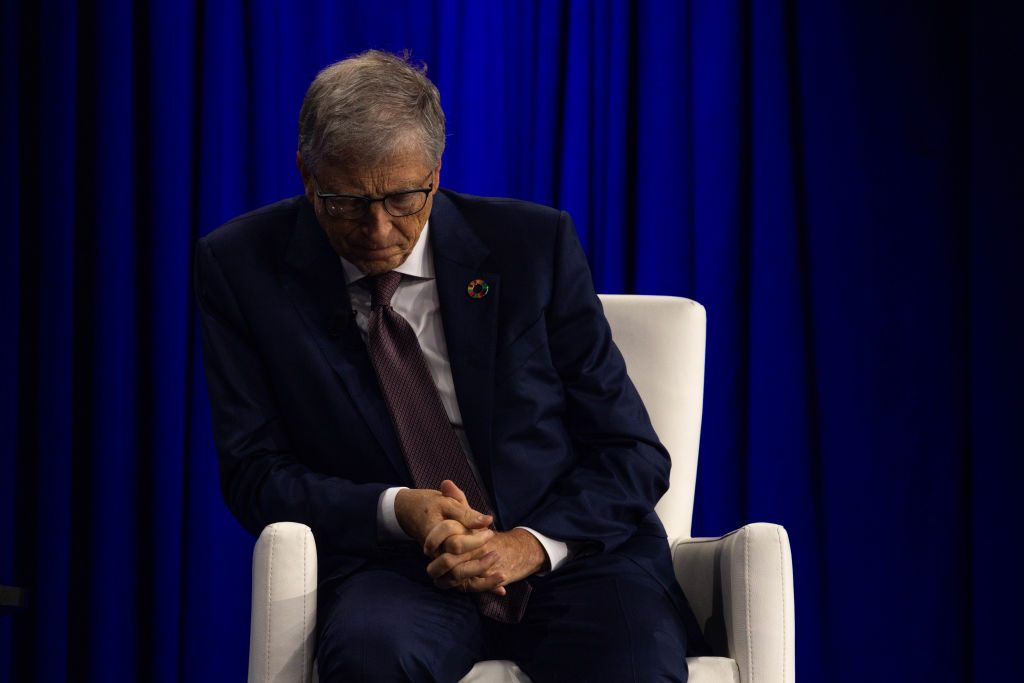Explore web search results related to this domain and discover relevant information.
The money paid off, and all three won. The Denver Classrooms Teachers Association is rooted in a local, democratic labor process since its funding comes from nearly 4,000 educators.
The model also weakens union influence“by reducing the number of schools whose teachers belong to the union, diminishing the union’s membership — and thus its power and its money.” · City Fund’s strategy has met with some resistance. In 2021, school board members from six cities criticized City Fund and their locally funded “activist groups” writing they “present themselves as local grassroots organizations when nothing could be further from the truth.” They warned that the billionaire-driven privatization erodes local control, divides school districts, and undermines democratic ideals.Mike DeGuire, veteran educator in Denver, fears that billionaires are paying the bills for a phony reform group that's trying to buy the Denver school board. The billionaires find Denver an enticing target because its leading public officials are DFER Democrats: Michael Bennett is a Colorado Senator and a big supporter of charter schools when…Mike DeGuire, veteran educator in Denver, fears that billionaires are paying the bills for a phony reform group that’s trying to buy the Denver school board. The billionaires find Denver an e…The billionaires find Denver an enticing target because its leading public officials are DFER Democrats: Michael Bennett is a Colorado Senator and a big supporter of charter schools when he was Denver’s Superintendent of Schools; Governor Jared Polis opened charter schools and is a charter cheerleader; Denver Mayor Mike Johnston, a former TFA and state legislator, loves charters and evaluating teachers by their students’ test scores (he sponsored legislation to make teacher evaluation-by-value-added-scores state law).

So, bottom line, for all these reasons, I’d argue that it’s indisputably true that, as Smart Virginia Politico #2 said, “Virginia Democrats have the issues and the money, Virginia Republicans have an [information/media disinformation/misinformation] ecosystem.” As for Smart Virginia ...
So, bottom line, for all these reasons, I’d argue that it’s indisputably true that, as Smart Virginia Politico #2 said, “Virginia Democrats have the issues and the money, Virginia Republicans have an [information/media disinformation/misinformation] ecosystem.” As for Smart Virginia Politico #1, who said that they “think people underestimate how much harder the information environment [for Democrats] is today when compared to 2017,” I’d argue that it’s definitely a worse environment than in 2017, but more broadly that the information environment has been deteriorating, from a Democratic perspective, for a couple decades now, with a definite worsening the past few years due to the change of ownership at Twitter, more right-wing bias at Meta, Jeff Bezos’ trashing of the WaPo, the continued decline/decimation of local news outlets, etc.Smart Virginia politico #2: “Virginia Democrats have the issues and the money, Virginia Republicans have an [information/media disinformation/misinformation] ecosystem.”A couple messages from smart Virginia politicos the past few days got me thinking - scary, I know! So first, here's what they said, slightly paraphrased: Smart Virginia politico #1: "I think people underestimate how much harder the information environment [for Democrats] is today when compared to 2017" Smart Virginia politico #2: "Virginia Democrats have...According to Northwestern University: “Donald Trump won the 2024 election with one of the smallest popular-vote margins in U.S. history, but in news deserts – counties lacking a professional source of local news – it was an avalanche. Trump won 91% percent of these counties over his Democratic rival, Kamala Harris, according to an analysis of voting data by Medill Journalism School’s State of Local News project.
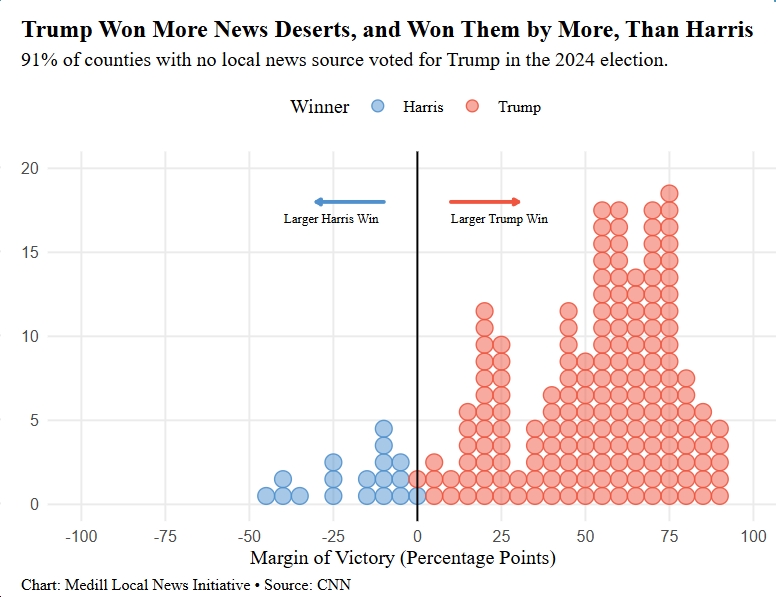

From Yasmin Radjy, Executive Director, Swing Left, Washington, DC, US
Recently, Wired published an article ... a secret Democrat influencer incubator that trained liberal and progressive content creators to push coordinated messaging across their shared social media platforms and paid them handsomely to do so. The fallout has been chaotic, at least in the left-wing influencer world: creators are shanking their rivals for participating in the program, and the paid influencers are trying to defend themselves for taking the money...
Recently, Wired published an article revealing the existence of a secret Democrat influencer incubator that trained liberal and progressive content creators to push coordinated messaging across their shared social media platforms and paid them handsomely to do so. The fallout has been chaotic, at least in the left-wing influencer world: creators are shanking their rivals for participating in the program, and the paid influencers are trying to defend themselves for taking the money.Or are they messengers for a political party, an extension of Democratic Party messaging and voter activation? What’s unique about this — and what is stoking some of the discontent and disagreement — is that a lot of people don’t see the issue with these creators taking money from politically aligned groups.So I’ve covered my share of MAGA influencer civil wars, for (oh, god) 10 years, and on the surface they’re kind of similar: so-and-so is taking money from this guy secretly! But clearly, MAGA hasn’t suffered from it. This is the first time that the Democrats have had actual community internet drama.Like, is it a situation where the audience will accept someone who’s, like, “progressive” or “left-leaning,” but then react negatively to anyone that’s associated with the official Democratic Party establishment — i.e., anything Biden / Harris-coded? “Gave money to Israel”-coded?

Candidates aren't the only ones raising record amounts of cash -- the political parties collect hundreds of millions of dollars each election cycle. The parties may only raise "hard money," which is given by individuals and political action committees and is subject to federal contribution limits.
Democratic Party · DNC · DCCC · DSCC · Republican Party · RNC · NRCC · NRSC · Soft Money Backgrounder · Sign up for our newsletter to track money’s influence on U.S. elections and public policy. OpenSecrets Following the money in politics ·Follow the money to state legislators in all 50 states.Dig into data on outside spending by party committees, super PACs and "dark money" groups.Search campaign expenditures to explore how candidates and political groups are spending donor money.

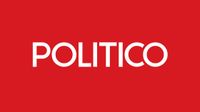
Editor’s note: Morning Money is a free version of POLITICO Pro Financial Services morning newsletter, which is delivered to our subscribers each morning at 5:15 a.m. The POLITICO Pro platform combines the news you need with tools you can use to take action on the day’s biggest stories. Act on the news with POLITICO Pro. Democrats ...
Editor’s note: Morning Money is a free version of POLITICO Pro Financial Services morning newsletter, which is delivered to our subscribers each morning at 5:15 a.m. The POLITICO Pro platform combines the news you need with tools you can use to take action on the day’s biggest stories. Act on the news with POLITICO Pro. Democrats are still wrestling with how the party should sharpen or refocus its economic pitch after its disastrous 2024 election performance.Delivered daily by 8 a.m., Morning Money examines the latest news in finance, politics and policy — and on Fridays, Morning Money: Capital Risk highlights the downstream effects on markets.Democrats, the group argues, should be putting household debt — both old-fashioned credit card, utility, and medical bills as well as the growing array of newfangled fintech credit products — at the center of their economic fight.Key Senate Dems unveil crypto bill wish list: A group of Senate Democrats who have signaled interest in supporting industry-friendly cryptocurrency legislation released a framework Tuesday outlining what they hope to see in a bill to overhaul how digital assets are regulated that Republicans are aiming to pass this fall, Jasper reports.
Robert Kennedy, I could watch that man all day long. He does a magnificent job. I think the Democrats made it very clear in that room that this is about the money. This is all about the money. Let's face it. And there's a lot of money floating around on Capitol Hill.
InsiderAdvantage pollster Matt Towery reacts to Thursday's Senate hearing with Health and Human Services Secretary Robert F. Kennedy Jr. SEAN HANNITY, FOX NEWS: Anyway, according to a new Insider Advantage poll, the American people on are on RFK's side. They're on MAHA's side.There's a lot of money floating around in campaigns. Comes from a lot of different sides in healthcare. But you saw endlessly the quotes came from groups like the American Academy of Pe -- for Pediatric -- a pediat -- Pediatrics -- Pediatricians. Those groups do lean left and a lot of the other groups who were quoted today do lean left. HANNITY: Yeah. TOWERY: So the quotes of facts you got from the Democrats, they weren't facts.TOWERY: Well, I don't think a lot of people watch Senate hearings. So, I think among the people who watch news and Senate hearings, I think it was a 50/50. Robert Kennedy, I could watch that man all day long. He does a magnificent job. I think the Democrats made it very clear in that room that this is about the money.They were just quoting other groups that agree with them. But I do think the Democrats didn't do any harm to Robert Kennedy. I think he's still a big plus for the Trump administration and I think he's moving forward. HANNITY: Matt Towery, we appreciate it as always.
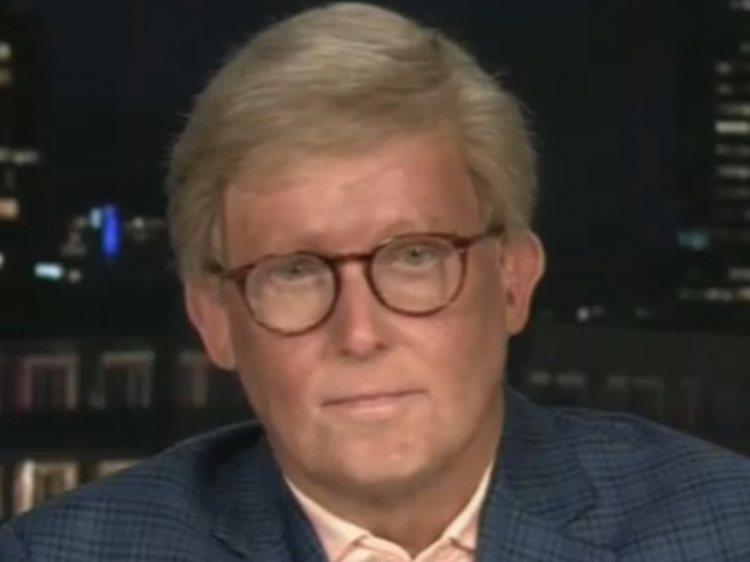

A major liberal dark money group is reportedly paying Democratic social media influencers thousands of dollars a month to promote progressive messaging online.
A major liberal dark money group is reportedly paying Democratic social media influencers thousands of dollars a month to promote progressive messaging online, WIRED reported Wednesday.Influencers who participated in the program could receive up to $8,000 per month, according toWIRED. The program, run by Chorus, a nonprofit arm of the influencer marketing platform Good Influence, is funded by theSixteen Thirty Fund, a major Democrat-aligned dark money group.Managed by the for-profit firmArabella Advisors, the Sixteen Thirty Fund pouredmillions into Democratic-aligned super PACs in the 2024 election cycle, campaign finance records show. Four anonymous donors accounted for nearly two-thirds of its 2023 revenue, according totax filings. “There are some real great advantages to … housing this program in a nonprofit,” a lawyer working with Chorus said to creators on a Zoom call reviewed by WIRED. “It gives us the ability to raise money from donors.In June, dozens of Democratic influencers with a combined following of at least 13 million were contacted about the Chorus Creator Incubator Program, which was pitched as a way to “expand their reach and impact,” according to the outlet.(RELATED: Democrats Betrayed Their Principles And Embraced Dark Money.
Last week, I published an article on WIRED titled "A Dark Money Group Is Secretly Funding High-Profile Democratic Influencers." The story describes an initiative aimed at boosting Democrats online that offers influencers up to $8,000 a month in dark money funding.
We also chat about how dark money is increasingly shaping content on the internet and being used for foreign propaganda campaigns. User Mag is a 100% reader-supported publication. To receive new posts and support my work, become a free or paid subscriber. How the Democrats keep copying the MAGA influencer playbook (and failing) + Monchhichi mania, the US Open's influencer problem, protein foam, Luigi for Shein, Wondermind's implosion, Beast phone, the Reese Witherspoon tech bubble indicator, & how Trump lost the podcast brosAs the fallout of the Chorus influencer program reveals, the Democratic establishment seems sclerotically incapable of existing in a media environment it cannot control.Since the story came out, a bunch of influencers in the program have tried to mislead people about what dark money is and isn't. Anna Massoglia is one of the top journalists in the country covering dark money.
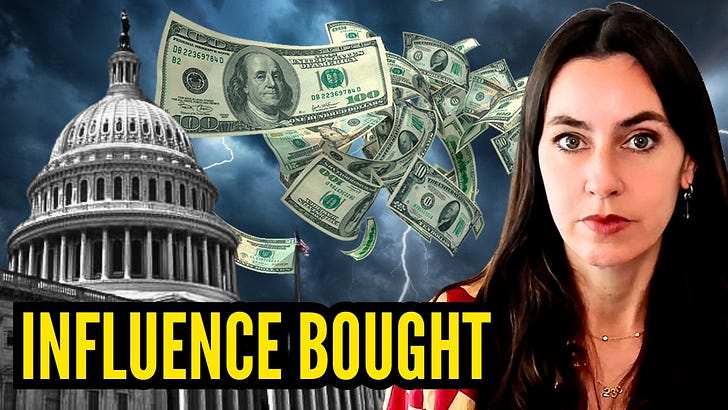

An initiative aimed at boosting Democrats online offers influencers up to $8,000 a month to push the party line. All they have to do is keep it secret—and agree to restrictions on their content.
Now, Democrats hope that the secretive Chorus Creator Incubator Program, funded by a powerful liberal dark money group called The Sixteen Thirty Fund, might tip the scales. The program kicked off last month, and creators involved were told by Chorus that over 90 influencers were set to take part.The Sixteen Thirty Fund has emerged as a powerful funder in Democratic spaces in recent years. Its website notes that issues supported by the organization include economic equity, affordable health care, climate solutions, racial justice, voter access, and other “essential social-change goals.” The organization was founded in 2009 as a liberal response to conservative dark money groups and organizations like the Koch network, and under Trump it has soared.“If the contract for getting money from a particular interest group says you can’t disclose it, then it’s pretty simple, you can’t take the money,” he says. “We’re living in an era where a lot of powerful people have basically taken the rule book and thrown it out the window.” (Wilson maintained in a post-publication email that “creators are free to work with other groups or take on other partnerships outside the Chorus program and say whatever they want as part of that work or on their own.”) Keith Edwards, a Democratic content creator who has skyrocketed to fame on YouTube since starting his channel last year, was not invited to be part of the program but believes that the way it was structured seemed “predatory.” He says that he would never agree to take part in a program that was run in secret or wouldn’t allow him to disclose funding.The influencers in the chat collectively had at least 13 million followers across social platforms. They represented some of the most well-known voices online posting in support of Democrats, and they’re key to wherever the party moves next.
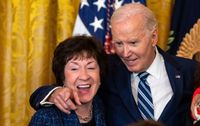
The rich Democrats raising money for Collins obviously either don’t understand or don’t accept the common refrain from their party leaders that this is a moment of maximum peril for democracy.
The problem of gerontocracy includes the donor class.On August 19, The New York Times reported that Collins will be attending a fundraiser on her behalf on September 26 in the Bel Air home of Sherry Lansing, the former Paramount Pictures chair and a prominent Democratic Party fundraiser. Media-industry bigwig Casey Wasserman, who shares the same political profile as Lansing, is cohosting the event.The Collins dinner offers a snapshot of the special world of wealthy Democratic donors, who enjoy outsize power even though they frequently make decisions that are terrible for both their party and their country.One would think that donors who identify as Democrats or even consider themselves friendly to the party would recognize that defeating Collins is essential—particularly since Maine, where Kamala Harris defeated Donald Trump by 7 percent in 2024, gives Democrats a rare chance to flip a Republican Senate seat in 2026.
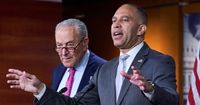
Some Democrats want a traditional appropriations path. Others want to make aggressive policy demands. Yet others say there can be no deal as long as Trump withholds money.
Others want to make an aggressive set of policy demands. Yet others say there can be no deal as long as President Donald Trump unilaterally withholds money directed by Congress. Some Democrats are leery of drawing red lines in a standoff, according to two people familiar with the dynamics.Pressed about whether Democrats should insist on including the health care money in a government funding bill, Shaheen replied: “I think there are a lot of options, and hopefully this will continue to be on the table.”WASHINGTON — When House Democrats gathered behind closed doors Tuesday to discuss strategy to avert a government shutdown, they agreed on one thing: They must use the leverage of the Sept. 30 deadline to advance their prioritiesIn the House meeting, lawmakers voiced anxieties about the nearing deadline, proposing a wide variety of ideas, multiple sources with knowledge of the discussion said. And they questioned whether their Senate counterparts would have the stomach for a fight after Minority Leader Chuck Schumer of New York and other key Democratic senators supported a Republican-only spending bill during the last shutdown deadline in March.
The White House notified Congress that it plans to use a legally untested maneuver to circumvent lawmakers and claw back more money for foreign aid programs.
The maneuver could further complicate lawmakers’ attempts to cobble together a bipartisan funding package to ensure the government does not shut down on Oct. 1. Any spending compromise must win Democratic support in the Senate to pass, and Democrats have said they would be loath to lend their votes to such a package if the White House continued unilaterally cutting congressionally approved funding.The administration’s proposal on Friday also infuriated Democrats.Representative Rosa DeLauro of Connecticut, her Democratic counterpart on the House panel, said she would “refuse to label Vought’s gambit a ‘pocket rescission,’ because it gives his unlawful attempt to steal the promises Congress enacted an air of legitimacy it does not deserve.”And Senator Chuck Schumer, Democrat of New York and the minority leader, suggested that the request was “further proof President Trump and Congressional Republicans are hellbent on rejecting bipartisanship and ‘going it alone’ this fall.”


A dark money group on the left is paying progressive influencers up to $8,000 a month to push Democrat policy ideas.
The “Chorus Creator Incubator Program” is said to be funded by the “Sixteen Thirty Fund,” a nonprofit sometimes portrayed as the left’s answer to the Koch network and which has funneled money to dozens of Democratic-friendly influencers, according to WIRED magazine.If they are willing to pay $8k a month of their own money on no name influencers, imagine how they treat your tax dollars https://t.co/Vbyga3Aosb · — Harrison Krank (@HarrisonKrank) August 28, 2025 · This is how popular Democrat ideas are.This is so typical. For all of the Democrats’ talk of getting ‘big money’ out of politics, they are the worst culprits of using big money to advance their agenda when it suits them.A secretive dark money group tied to the Democratic Party is paying online influencers up to $8,000 a month to disseminate left-leaning talking points, according to a report.

The “Chorus Creator Incubator Program” is said to be funded by the “Sixteen Thirty Fund,” a nonprofit sometimes portrayed as the left’s answer to the Koch network and which has funneled money to dozens of Democratic-friendly influencers, according to WIRED magazine.
A secretive dark money group tied to the Democratic Party is paying online influencers up to $8,000 a month to disseminate left-leaning talking points, according to a report.But while right-wing influencers often receive direct funding through PACs or campaigns, Democrats are now accused of using nonprofit intermediaries to obscure the money trail."Chorus Creator Incubator Program" said to be brainchild of Sixteen Thirty Fund, nonprofit accused of operating as left’s answer to the Koch network.They include Olivia Julianna, the Gen Z activist who spoke at the 2024 Democratic National Convention; Loren Piretra, a former Playboy executive turned Occupy Democrats YouTuber; and Barrett Adair, the content creator who runs a viral American Girl Doll–themed meme account.
OpenSecrets is the nation's premier research group tracking money in U.S. politics and its effect on elections and public policy. We provide comprehensive and reliable data, analysis and tools for policymakers, storytellers and citizens. ... Both President Donald Trump and Democratic nominee ...
OpenSecrets is the nation's premier research group tracking money in U.S. politics and its effect on elections and public policy. We provide comprehensive and reliable data, analysis and tools for policymakers, storytellers and citizens. ... Both President Donald Trump and Democratic nominee Joe Biden agree that the 2020 election is the most important election ever.Trump began raising money for his reelection campaign in the early days of his presidency, building up a war chest dubbed "insurmountable" by some experts. But Biden rode Democratic enthusiasm to smash fundraising records and surpass the Trump campaign's fundraising haul during the final months of the election cycle.Cory Booker is a Democratic senator from New Jersey and the first African American to represent his home state in that role. Prior to his time in the Senate, he was mayor of Newark, New Jersey. “Street Fight,” a documentary about Booker’s mayoral-run, received an Oscar nomination in 2006. ... Steve Bullock is the governor of Montana. He rose to prominence as a staunch opponent of Citizens United and "dark money," enacting some of the country's toughest transparency laws.As we inch closer to the 2020 election, we begin to see groups working on behalf of each of the most serious White House hopefuls – leadership PACs, super PACs, 501(c)(4) dark money outlets and more – crop up and start spending in support of their favored candidates.


Dayen discusses what seems to be the developing Democratic strategy, which probably isn’t a good one. If anything, the lawless actions and usurped spending powers by the Trump administration in the intervening six months have grown worse. One rescission package to reverse already approved ...
Dayen discusses what seems to be the developing Democratic strategy, which probably isn’t a good one. If anything, the lawless actions and usurped spending powers by the Trump administration in the intervening six months have grown worse. One rescission package to reverse already approved appropriations has passed; another “pocket rescission,” where the administration is trying […]WASHINGTON, DC – NOVEMBER 13: Senate Minority Leader Chuck Schumer (C) (D-NY) meets with newly-elected Democratic senators-elect Kyrsten Sinema (L) (D-AZ) and Jacky Rosen (R) (D-NV) in his office at the U.S. Capitol November 13, 2018 in Washington, DC. Both Sinema and Rosen were formerly members of the House of Representatives before being elected to the U.S.Once again, Democrats can decide whether to participate in this destruction of the nation’s founding principles, or resist it. It’s a rare point of leverage in a time when national policy is being run almost exclusively out of the Oval Office. I’ve been skeptical that Democrats have any real strategy for what to do.Reporting indicates that Democrats will use the imminent expiration of Affordable Care Act subsidies as a bargaining chip in the shutdown showdown. Votes could be exchanged for an extension of those subsidies, which run out at the end of the year.
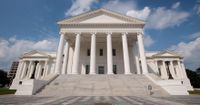
The national Democratic organization that focuses on state legislatures is sending nearly $1.5 million to Virginia. The money from the Democratic Legislative Campaign Committee will boost the House Democratic Caucus' bid to expand its 51-49 majority in the House of Delegates and the bid by ...
The national Democratic organization that focuses on state legislatures is sending nearly $1.5 million to Virginia. The money from the Democratic Legislative Campaign Committee will boost the House Democratic Caucus' bid to expand its 51-49 majority in the House of Delegates and the bid by state Sen.The money adds to the flood of Democratic funds surging into House races.The Democratic Legislative Campaign Committee is further boosting Virginia Democrats' bid to increase their margin in the House of Delegates and win the race for lieutenant governor.With the money, the committee is adding four more House races to its list of targets.
An initiative aimed at boosting Democrats online offers influencers up to $8,000 a month to push the party line. All they have to do is keep it secret—and agree to restrictions on their content.
Now, Democrats hope that the secretive Chorus Creator Incubator Program, funded by a powerful liberal dark money group called The Sixteen Thirty Fund, might tip the scales. The program kicked off last month, and creators involved were told by Chorus that over 90 influencers were set to take part.The Sixteen Thirty Fund has emerged as a powerful funder in Democratic spaces in recent years. Its website notes that issues supported by the organization include economic equity, affordable health care, climate solutions, racial justice, voter access, and other “essential social-change goals.” The organization was founded in 2009 as a liberal response to conservative dark money groups and organizations like the Koch network, and under Trump it has soared.“If the contract for getting money from a particular interest group says you can’t disclose it, then it’s pretty simple, you can’t take the money,” he says. “We’re living in an era where a lot of powerful people have basically taken the rule book and thrown it out the window.” (Wilson maintained in a post-publication email that “creators are free to work with other groups or take on other partnerships outside the Chorus program and say whatever they want as part of that work or on their own.”) Keith Edwards, a Democratic content creator who has skyrocketed to fame on YouTube since starting his channel last year, was not invited to be part of the program but believes that the way it was structured seemed “predatory.” He says that he would never agree to take part in a program that was run in secret or wouldn’t allow him to disclose funding.The influencers in the chat collectively had at least 13 million followers across social platforms. They represented some of the most well-known voices online posting in support of Democrats, and they’re key to wherever the party moves next.

Democrats’ dark-money superstructure is flailing as the party struggles to rebrand and reorganize. A pair of reports published this week illustrate the problem. According to the New York Times, the Gates Foundation is severing ties with groups managed by the influential Arabella Advisors, ...
Democrats’ dark-money superstructure is flailing as the party struggles to rebrand and reorganize. A pair of reports published this week illustrate the problem. According to the New York Times, the Gates Foundation is severing ties with groups managed by the influential Arabella Advisors, while Wired reports growing controversy over a dark-money network called Chorus working [...]Read More...Along with the Arabella saga, what these controversies reveal is a deep confusion on the Left about how to counter the Right’s thriving dark-money apparatus, currently unified by the urgent prospect of controlling all three branches of government — including a White House eager to upend norms. Republican targeting of the Left, for example, was listed by the Times recently as including: “Executive actions intended to cripple top Democratic law firms.As some in the party believe it needs to look more like Zohran Mamdani and less like Andrew Cuomo, others such as Rep. Jim Clyburn, firmly believe the exact opposite, and dark-money groups are panicking. Do Democratic leaders and benefactors want truly independent media creators?As Democrats are tugged in two opposite directions, the dark-money network American progressives have built up and relied on for years is standing at the crossroads, struggling to pick between paths or forge another.
